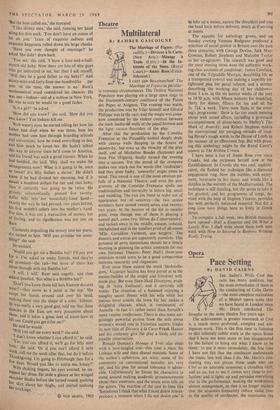Theatre
Multilateral
By BAMBER GASCOIGNE The Marriage of Figaro. (Pic-
cadilly.)—Divorce a la Carte. (New Arts.)—Menage Trois. (Lyric.)—In the In- terests of the State. (Royal Court.)—Annie Ross.(Estab- lishment.) 1 LAST saw Beaumarchais' The Marriage of Figaro in peculiar- ly romantic circumstances. The Theatre National Populaire was playing on a large open stage in the fourteenth-century courtyard of the Palais des Papes at Avignon. The evening was warm, the production was by Vilar himself and Gerard Philippe was in the cast; and the magic was some- how completed by the violent contrast between the stark medieval walls of the papal fortress and the light rococo flourishes of the play.
After this the production by the Comedic Francaise at the Piccadilly looked deeply drab, with canvas walls flapping in the breeze of passers-by; but even so the vivacity of the play itself, and of Micheline Boudet (Suzanne) and Jean Piat (Figaro), finally turned the evening into a success. Yet the mood of the company makes one reach out for words like 'creditable'; had they done badly, 'unworthy' might come to mind. This mood is one of the most obvious pit- falls of a National Theatre, and even the pro- gramme of the Comedie Francaise spells out traditionalism and hierarchy in letters big, small and middling. The cast are listed in order not of appearance but of seniority—the two senior members have served twenty-seven and twenty- two years. At the bottom of the list in smaller print, even though one of them is playing a named part, come two 'eleves•du Conservatoire'; and tucked away in the middle, unique, isolated, unexplained and in the smallest print of all comes 'Mlle. Geraldine Valmont, une bergere.' The dancers and extras are apparently nameless. This pyramid of petty distinctions should be 'a timely warning in planning the artists' contracts for our own National Theatre. Peter Hall's three-year contracts would seem to be a good compromise between insecurity and stagnation.
Ever since Shaw coined the word `Sardoodle- dom,' Victorian Sardou has been jeered at as the master-builder of the empty and friVolous well- made play. But even Shaw liked Divorcons, prais- ing its 'witty liveliness'; and it certainly still works. The situation of a husband enjoying a naughty secret dinner with his wife while her jealous lover combs the town for her makes a delightful charade which is reminiscent of Anouilh- --in fact it's rather better than Anouilh's more routine confections. There is also some sur- prisingly powerful protest from the wife about woman's sexual role in Victorian society. Under its new title of Divorce a la Carte Frank Hauser and his company give the play a lively and en- joyable resurrection.
Ronald Duncan's Menage d Trois also deals with a love-tangled trio—this time a man, his Lesbian wife and their shared mistress. Some of the author's aphorisms are witty, some of his comments on conventional morality are very apt, and his plea for sexual tolerance is admir- able. Unfortunately he forces his characters to stand around making academic pronouncements about their emotions, and the strain soon tells on the actors. The reaction of the cast to lines like 'Sometimes I think that what I most desire is to ex- perience a moment when I do not desire you' is to take up a stance, square the shoulders and toss the head back before delivery, much as if serving at tennis.
The appetite for anthology grows, and on Sunday evening Vanessa Redgrave produced a selection of social protest in Britain over the past three centuries, with George Devine, Jack Mac- Gowran, Robert Stephens and Malcolm Taylor as her co-agitators. The research was good and the most moving items were the authentic work- ing-class accounts of conditions : James Lovelace, one of the Tolpuddle Martyrs, describing life as a transported convict and making a superbly en- lightened plea for penal reform; and a mother describing the working day of her children— from 3 a.m. in the six busiest weeks of the year to 10.30 p.m, with fifteen minutes for breakfast, thirty for dinner, fifteen for tea and all for 3s. 74d. a week. There were flaws in the even- ing's programme: there is far too much messing about with sound effects, including a grotesque accompaniment of .drum-beats to Shelley's The Mask of Anarchy; and Robert Stephens makes the conventional but enraging mistake of read- ing Byron's tough words to the House of Lords in the manner of an effeminate fop. But with prun- ing this anthology might be the Royal Court's answer to The Hollow Crown.
I have been a fan of Annie Ross ever since Cranks, but she surpasses herself now at the Establishment. In Cranks she was cool, sophisti- cated; she flashed her technique Like a diamond engagement ring. Now she bubbles with enjoy- ment, luxuriates in her music and words like a dolphin in the warmth of the Mediterranean. The technique is still dazzling, but she seems to take it for granted; and her programme of sonis, de- vised with the help of Stephen Vinaver, provides her with perfectly balanced material. Not for a long time have things been so lively in Greek Street.
To complete a. full week, two British musicals have opened—Hoff a Sixpence and Oh What a Lovely War. I shall write about them both next week with How to Succeed in Business Without Really Trying.














































 Previous page
Previous page